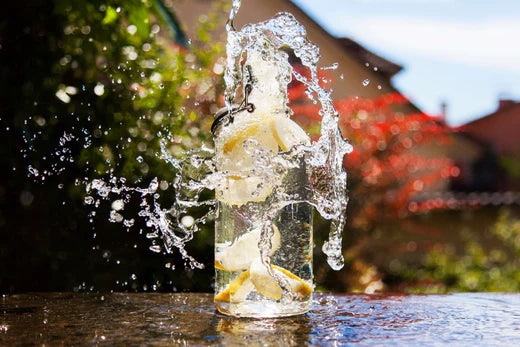Why you should drink more tap water
A small movement, a flick of the wrist, a push of a button, nothing more, and the clearest water gushes out of the tap. For us, it's completely normal to be able to drink water straight from the tap without hesitation, even in a public station toilet. While millions of people around the world have no clean drinking water, we can find a well with drinkable water even on the loneliest mountain pasture. And yet people in this country buy liters of mineral water from the supermarket - much of it imported from abroad. Why does this make neither ecological nor economic sense? Here are a few answers.
Good and healthy
Let's start with the quality of Swiss tap water. According to the Ordinance on the Requirements for Drinking Water this is regulated very precisely. Which substances and how much of them may the drinking water contain? How must it be treated? What should it look like and how should it taste? All this makes tap water the most tested foodstuff in Switzerland and of better quality than many bottled waters.
But that's not all. Most of the water from our taps consists of groundwater and spring water (around 80 percent). This is rainwater that seeps into the ground and then either bubbles back up to the surface (spring water) or is pumped out of the ground (groundwater). In both cases, the water seeps through various layers of rock. During this process, it is enriched with minerals that are important for the human body, such as potassium, sodium or chloride, which we absorb when we drink it. And, of course, tap water contains no calories, which is not unimportant in this day and age of fitness hype.
The environment thanks you
But tap water is not only a super drink because it is good for us. After all, so is bottled mineral water. But unlike mineral water, the consumption of tap water is much more sustainable. It doesn't take much to come to this conclusion. While tap water simply has to be pumped out of the ground or from its source and then fed into the pipe system, the situation is different with bottled mineral water.
Here, the water is bottled from sources all over the world (e.g. Fiji water from Fiji, Evian from France, etc.) and transported to our supermarkets. Whether by truck, ship or plane, this results in highCO2 emissions. Not to mention the car journey from the supermarket to our homes. The water is then cooled there and the PET bottle is disposed of after drinking. A study by the SVGW (Swiss Gas and Water Industry Association) on the environmental impact of drinking water states that the average mineral water has 450 times the environmental impact of tap water - imagine that. And here's the best part: tap water is around 10,000 times cheaper than mineral water from the supermarket.
So, let's summarize: Tap water is healthy, of impeccable quality, just a tap away, sustainable and then cheap. And yet we consume an average of one 3-liter bottle of mineral water per person every day. We at FILL ME think this is nonsensical. That's why our FILL ME bottle is not just a drinking bottle, but a symbol for the drinking water promotion - for conscious and sustainable consumer behavior.

